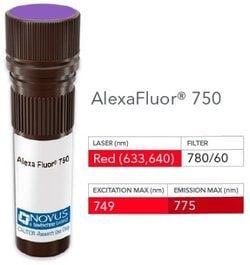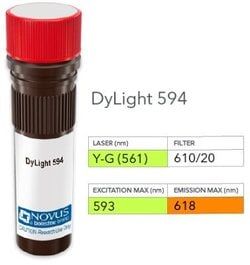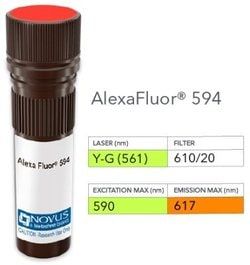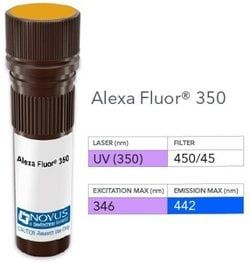FoxP3 Antibody (SPM579), Janelia Fluor™ 646, Novus Biologicals™
Manufacturer: Novus Biologicals
Select a Size
| Pack Size | SKU | Availability | Price |
|---|---|---|---|
| Each of 1 | N234432J646-Each-of-1 | In Stock | ₹ 58,562.00 |
N234432J646 - Each of 1
In Stock
Quantity
1
Base Price: ₹ 58,562.00
GST (18%): ₹ 10,541.16
Total Price: ₹ 69,103.16
Antigen
FoxP3
Classification
Monoclonal
Conjugate
Janelia Fluor 646
Formulation
50mM Sodium Borate with 0.05% Sodium Azide
Gene Symbols
FOXP3
Immunogen
Full-length human FoxP3 protein (Uniprot: Q9ZS1)
Quantity
0.1 mL
Primary or Secondary
Primary
Test Specificity
Recognizes a protein of 47-55kDa, which is identified as FOXP3. Its precise epitope is not known, but it has been mapped to the N-terminal portion of the protein. The FOX family of transcription factors is a large group of proteins that share a common DNA binding domain termed a winged-helix or forkhead domain. During early development, FOXP1 and FOXP2 are expressed abundantly in the lung, with lower levels of expression in neural, intestinal and cardiovascular tissues, where they act as transcription repressors. FOXP1 is widely expressed in adult tissues, while neoplastic cells often exhibit a dramatic change in expression level or localization of FOXP1. Mutations in FOXP3 gene cause IPEX, a fatal, X-linked inherited disorder characterized by immune dysregulation. The FOXP3 protein is essential for normal immune homeostasis. Specifically, FOXP3 represses transcription through a DNA binding forkhead domain, thereby regulating T cell activation.
Content And Storage
Store at 4°C in the dark.
Applications
Flow Cytometry, ELISA, Immunocytochemistry, Immunofluorescence, Immunohistochemistry (Frozen)
Clone
SPM579
Dilution
Flow Cytometry, ELISA, Immunocytochemistry/Immunofluorescence, Immunohistochemistry-Frozen
Gene Alias
AIID, AIIDMGC141961, DIETER, forkhead box P3, Forkhead Box Protein P3, FOXP3delta7, immune dysregulation, polyendocrinopathy, enteropathy, X-linked, Immunodeficiency, Polyendocrinopathy, Enteropathy, X-Linked, IPEX, JM2, MGC141961, MGC141963, PIDX, PIDXMGC141963, Scurfin, XPID, XPIDpolyendocrinopathy, enteropathy, X-linked
Host Species
Mouse
Purification Method
Protein A or G purified
Research Discipline
Adaptive Immunity, Cell Biology, Chromatin Research, Immunology, Regulatory Immunology, Transcription Factors and Regulators
Gene ID (Entrez)
50943.0
Target Species
Human, Mouse, Primate
Isotype
IgG1 κ
Related Products
Description
- FoxP3 Monoclonal specifically detects FoxP3 in Human, Mouse, Monkey samples
- It is validated for Western Blot, Flow Cytometry, Immunohistochemistry, Immunohistochemistry-Paraffin.





